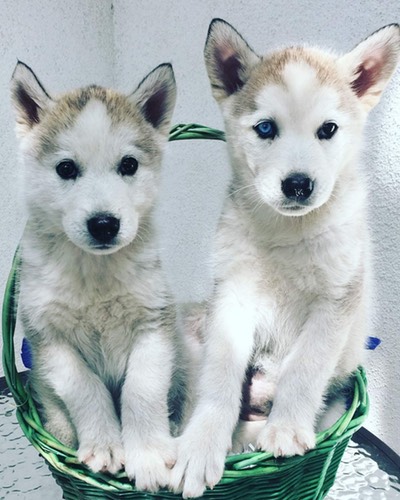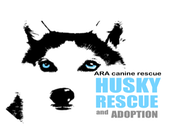While we are not dog trainers we do successfully potty train A LOT of dogs using these steps.

Puppy potty training takes patience and consistency.
Don’t give up! Keep in mind that puppies are unable to completely control their bowels until they are about four to six months old. You will have some success during the early months; however, you should expect accidents.
To avoid difficult clean-ups, keep puppies supervised at all times, keep them on an easy-to-clean surface such as tile when they are unsupervised, until you are certain that your pup is housebroken.
Puppy pads are a good thing in the early weeks but the goal is to get your pup outside to go pee and poop. Gradually begin to move the puppy pads closer and closer to the outside door so that your husky is walking further to reach the puppy pad. When you feel you are making good progress move the puppy pad outside. Pick him up and move him outside to go...the smell of the soiled puppy pad will help trigger him. Also, move any poop that he has done in the house outside to an area that you want him to go toilet in, the goal here is to give him the distinct smell of his "toilet" as dogs will be motivated to mark and pee in an area that smells like pee.
Pups are sometimes too excited to go the bathroom when they get outside, all the smells and nature can distract them...don't let your pup back in the house until he has relieved himself...if you bring him back in the house before he has gone then he is likely to squat in your house because all the outside excitement is over. Keep taking him over to the area that you have designated his "toilet" where you places his puppy pad or poop.
Housebreaking a puppy requires that you let him outside often to potty. We recommend that, at first, you let your pup outside every hour.
Puppies should always be encouraged to potty just before you retire for the night. Likewise, as soon as he wakes up in the morning, the first thing your pup will need to do is relieve himself. You should waste no time in taking him outside as soon as he awakes. When your pup hears you get up in the morning, it will be his signal to wake, so attend to him before going about your morning routine.
Some pups may cry that they need to potty at the first sign of light, and if you want a dry floor or crate, it is usually necessary to immediately respond to their needs.Your pup will also have to relieve himself shortly after a meal, and will need to urinate more often during the summer when his water intake is higher. As soon as your pup finishes dinner, take him to his outdoor place to potty until he relieves himself.
At other times, you may notice your pup sniffing the floor for a suitable place to go. He may whimper or start to squat. Scoop him up immediately and place him outside.
As with adult dog marking, the key to training your puppy not to wet in the house is to prevent him from leaving his urine scent in the house. Dogs, being creatures of habit, are enticed to mark in these same spots by the urine odor.
If your puppy does wet in the house, clean any areas where your dog has urinated with a product made specifically to clean and deodorize dog urine.
You can find hidden soiled areas easily with the use of a blacklight. Urine-stained areas will glow when a blacklight is shined on them. You will be surprised at all of the hidden areas you will discover. Once you find the areas that need to be cleaned, use a product that will remove the urine stain and odor. Products such as baking soda or club soda won’t break down the urine and thoroughly remove it from your carpet and furniture. Unless the urine is completely removed, your dog will recognize even the smallest scent that you can’t notice, and he will be drawn to re-wet the area.
Another important part of puppy housetraining is to be proactive and prevent your dog’s opportunities to wet in the house. This will take time, effort, and patience on your part, but it will make the puppy housebreaking process move along much quicker and will pay in the long run.
When housebreaking your puppy, the most important thing to remember is that your dog should be loose in the house ONLY when you can watch him at all times.
